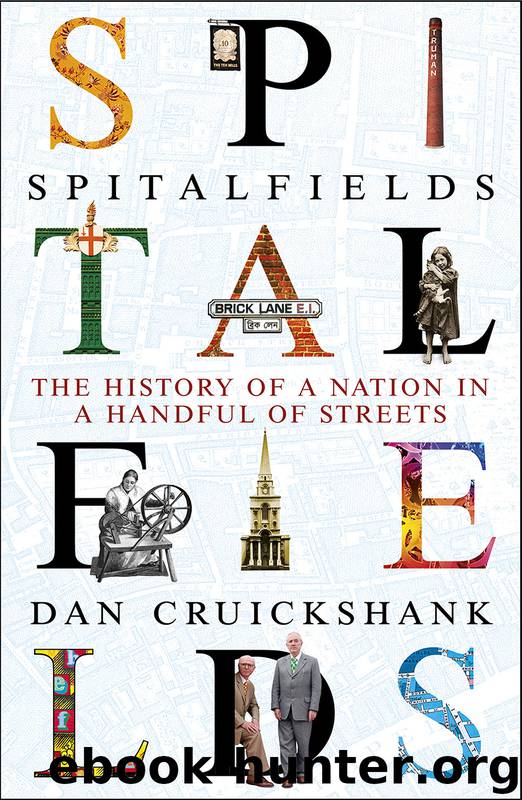Spitalfields by Dan Cruickshank

Author:Dan Cruickshank
Language: eng
Format: epub
Publisher: Random House
Published: 2016-10-19T16:00:00+00:00
FOURTEEN
SOUP KITCHENS AND BODY-SNATCHERS
Spitalfields in the Late Regency Period
THE INCREASE OF poverty in Spitalfields throughout the 1830s was linked not only to the repeal of the Spitalfields Acts in 1824, which served to reduce wages and increase unemployment, but also to a sharp rise in its population figures. Until the first meticulous census was conducted in 1841, it’s difficult to be sure of exact numbers, but it seems likely that the population of Spitalfields (along with the Liberties and those parts of surrounding parishes that had become part of the area generally regarded as Spitalfields) more or less doubled in the period 1801–31 to between 65,000 and 80,000.1 This was a pattern reproduced nationally. In the same period, as the first phase of the Industrial Revolution took hold, the population of England and Wales grew from 9 million to nearly 14 million. And just as Spitalfields buckled under the strain of a larger but more impoverished population, so areas of extreme deprivation spread across the country as a whole.
The response of government was to attempt to create a more efficient mechanism for dealing with the poor (a process that was to continue throughout the nineteenth century). And efficiency equated with toughness. Under the terms of the Poor Law Amendment Act of 1834, and subsequent and related legislation, the system of poor relief was tightened to ensure a more cost-effective use of resources. Poor people who sought help could no longer live at home and receive funds, as they once had. Instead, they had to resort to workhouses whose regimes were specifically designed to deter malingerers and offer assistance only to the truly destitute. These institutions, in other words, were intended to be so unpleasant that only the desperate would want to take refuge there. It was a form of state punishment of the poor underscored by an assumption that their poverty was not only their own fault but, in a sense, a crime against society – an unhappy state of affairs that greatly antagonised such liberal-minded people as Charles Dickens. Several of his novels, from Oliver Twist (serialised 1837–9) onwards, were to highlight the evils of the workhouse system.
A key expression of this streamlining of poor relief was the uniting of different parishes into Unions and, simultaneously, the replacement of scattered, smaller parish workhouses by fewer, larger Union institutions. In Spitalfields and Whitechapel, a new Union workhouse was built in 1842 in Vallance Road to replace the old parish workhouses serving Spitalfields that had stood in Bell Lane from the late 1720s (see here) and in ‘Charles Street’ (as Vallance Road was originally named) in Mile End New Town. The new Whitechapel and Spitalfields Workhouse served nine parishes and Liberties, including – together with Christ Church Spitalfields and St Mary’s Whitechapel – the Liberties of Norton Folgate and the Old Artillery Ground as well as the parish of St Botolph’s Aldgate. The workhouse was enlarged in 1859 in gaunt and forbidding manner to comprise three large wards, with males and
Download
This site does not store any files on its server. We only index and link to content provided by other sites. Please contact the content providers to delete copyright contents if any and email us, we'll remove relevant links or contents immediately.
| Africa | Americas |
| Arctic & Antarctica | Asia |
| Australia & Oceania | Europe |
| Middle East | Russia |
| United States | World |
| Ancient Civilizations | Military |
| Historical Study & Educational Resources |
Underground: A Human History of the Worlds Beneath Our Feet by Will Hunt(12098)
Sapiens by Yuval Noah Harari(5370)
Navigation and Map Reading by K Andrew(5157)
The Sympathizer by Viet Thanh Nguyen(4390)
Barron's AP Biology by Goldberg M.S. Deborah T(4150)
5 Steps to a 5 AP U.S. History, 2010-2011 Edition (5 Steps to a 5 on the Advanced Placement Examinations Series) by Armstrong Stephen(3734)
Three Women by Lisa Taddeo(3433)
Water by Ian Miller(3186)
The Comedians: Drunks, Thieves, Scoundrels, and the History of American Comedy by Nesteroff Kliph(3079)
Drugs Unlimited by Mike Power(2594)
A Short History of Drunkenness by Forsyth Mark(2297)
DarkMarket by Misha Glenny(2212)
And the Band Played On by Randy Shilts(2209)
The House of Government by Slezkine Yuri(2206)
The Library Book by Susan Orlean(2069)
Revived (Cat Patrick) by Cat Patrick(1992)
The Woman Who Smashed Codes by Jason Fagone(1973)
The Absolutely True Diary of a Part-Time Indian by Sherman Alexie(1913)
Birth by Tina Cassidy(1904)
